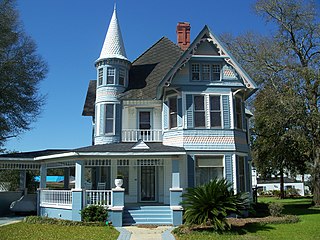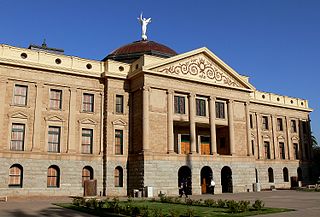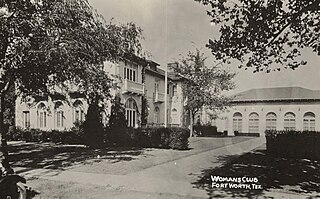
Ellis County is a county located in the U.S. state of Texas. As of 2020, its population was estimated to be 192,455. The county seat is Waxahachie. The county was founded in 1849 and organized the next year. It is named for Richard Ellis, president of the convention that produced the Texas Declaration of Independence. Ellis County is included in the Dallas–Fort Worth–Arlington metropolitan statistical area.

Midlothian is a city in northwest Ellis County, Texas, United States. The city is 25 miles (40 km) southwest of Dallas. It is the hub for the cement industry in North Texas, as it is the home to three separate cement production facilities, as well as a steel mill. The population of Midlothian grew by 121% between 2000 and 2010, to a population of 18,037.

Waxahachie is the county seat of Ellis County, Texas, United States. Its population was 41,140 in 2020.

The Will Rogers Memorial Center (WRMC) is a 120-acre (0.49 km2) American public entertainment, sports and livestock complex located in Fort Worth, Texas. It is named for American humorist and writer Will Rogers. It is a popular location for the hosting of specialized equestrian and livestock shows, including the annual Fort Worth Stock Show, the annual National Reined Cow Horse Association Snaffle Bit Futurity, the World Championship Paint Horse Show, and 3 major events of the National Cutting Horse Association each year. It is also the former home of the Fort Worth Texans ice hockey team, and it hosted a PBR Bud Light Cup Series event annually from 1995 to 2004. Events at the WRMC attract over 2 million visitors annually. The complex contains the following facilities:

The Colorado Chautauqua, located in Boulder, Colorado, United States, and started in 1898, is the only Chautauqua west of the Mississippi River still continuing in unbroken operation since the heyday of the Chautauqua Movement in the 1920s. It is one of the few such continuously operating Chautauquas remaining in the United States, and was designated a National Historic Landmark in 2006. According to its governing body, the Colorado Chautauqua Association, it is also unique in that it is the only year-round Chautauqua.

The DeFuniak Springs Historic District is a U.S. historic district located in DeFuniak Springs, Florida. DeFuniak Springs, originally Lake DeFuniak, was named after Fred DeFuniak, the chief executive of the Louisville and Nashville Railroad. The district is bounded by Nelson and Park Avenues and 2nd and 12th Streets. It contains 172 historic buildings and 2 objects.

The Chautauqua Hall of Brotherhood is a historic site in DeFuniak Springs, Walton County, Florida. It was constructed as part of the Chautauqua education movement and is located at 95 Circle Drive. It is now used to house a branch of the Walton County Chamber of Commerce. On August 7, 1972, it was added to the U.S. National Register of Historic Places.

The Chautauqua Auditorium is a wooden building constructed for the first season of the Colorado Chautauqua in 1898, and through the years has been a venue for many lectures, musical performances, and motion pictures both primitive and modern.

James Riely Gordon was an architect who practiced in San Antonio until 1902 and then in New York City, where he gained national recognition. J. Riely Gordon is best known for his landmark county courthouses, in particular those in Texas. Working during the state's "Golden Age" (1883–1898) of courthouse construction, Gordon saw 18 of his designs erected from 1885 to 1901; today, 12 remain.

This is a list of the National Register of Historic Places listings in Meeker County, Minnesota.

Saint Paul's Episcopal Church is a historic church building at 308 N. Monroe in Waxahachie, Texas.

The Southside Masonic Lodge No. 1114 is a Masonic Lodge located in Fort Worth, Texas. The lodge was chartered on December 6, 1915, by the Grand Lodge of Texas, Ancient, Free & Accepted Masons. It was the fifth Masonic lodge in the city of Fort Worth chartered by the Grand Lodge of Texas, and its success in following decades was due to the growth of the south side of the city.

The Fort Leaton State Historic Site is located on Farm to Market Road 170, in Presidio County in the U.S. state of Texas. The original adobe structure was a private residence dating back to the early 19th century. It was purchased in 1848 by Benjamin Leaton, who adapted it as a fortress. Fort Leaton was the Presidio County original seat of government. Through murders, financial difficulties and abandonment, the structure changed hands numerous times. In 1967, it was deeded to the state of Texas and opened to the public in 1978 as a Texas State Historic Site. It was added to the National Register of Historic Places listings in Presidio County, Texas on June 18, 1973.

The town hall of Winchester, New Hampshire, is located on Main Street, just south of the junction of New Hampshire Route 10 and New Hampshire Route 119 in the center of the town.

The Fort Worth Masonic Temple is a Masonic Temple located at 1100 Henderson Street, Fort Worth, Texas. Designed by Wiley G. Clarkson, the Neoclassical/early PWA Art Moderne structure was completed in 1931 and has largely remained unchanged. The building was listed on the National Register of Historic Places in 2017 as Masonic Temple.

Chautauqua Park Historic District is a nationally recognized historic district located in Sac City, Iowa, United States. It was listed on the National Register of Historic Places in 2014. The park consists of the Chautauqua Auditorium, Asa Platt gates, Metcalf cabin, a fish house, a small stone bridge, and a shelter house.

The Woman's Club of Fort Worth is one of the city's oldest membership organizations, formed in 1923 by the members of several existing woman's clubs. The Woman's Club complex comprises eight historic buildings on Fort Worth's Near Southside and was listed on the National Register of Historic Places in 2017. As with many woman's clubs in the United States, the Woman's Club of Fort Worth has its roots in the Progressive Movement, with its original mission of "the cultural and civic advancement of Fort Worth; and the study of literature, history, science, painting, music, and other fine arts."




















